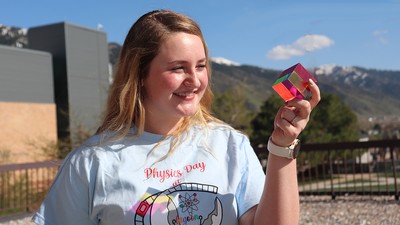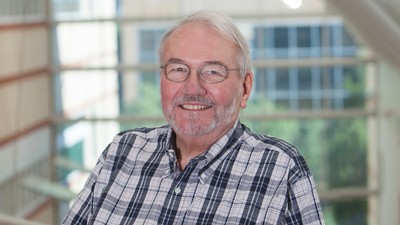USU Undergrad Researcher Explores Policies to Slow Antibiotic Resistance
By Mary-Ann Muffoletto |
From left, undergrad researchers Kade Roberts and Dallin Blotter (now a med student in Iowa) and grad student Ashley Scheesley in an Institute for Antiviral Research lab at USU. Roberts is among Aggies presenting to Utah legislators on Feb. 2.
Within a few, short decades, Americans, along with people throughout the world, have come to rely on modern antibiotics to treat commonly occurring maladies, such as strep throat and sinus infections. Yet the convenience and effectiveness of these so-called miracle drugs has also fostered complacency, along with the increasing incidence of dangerous antibiotic resistance.
“This is an emerging crisis, facilitated by the misuse of antibiotic drugs,” says Utah State University undergraduate researcher Kade Roberts. “If current trends continue, antibiotic-resistant superbugs could shatter our healthcare and agricultural systems, forcing us to revert to a pre-antibiotic era.”
Roberts is among nine USU undergraduates, who’ll present their work to state legislators in group Zoom calls Tuesday, Feb. 2, as part of the 2021 Undergraduate Research Day on Utah’s Capitol Hill.
Initiated by USU in 2000, the annual event is designed to showcase the importance of research in undergraduate education. Pandemic restrictions this year preclude the usual in-person gathering in the Capitol rotunda, where three times as many student presenters set up research posters and mingle with lawmakers and visitors.
A dual biochemistry and cellular biology major, Roberts hit upon the idea of exploring policies that could curb the threat of antibiotic-resistance as a participant in USU’s Center for Anticipatory Intelligence.
“As a scientist, I never thought the study of national security could be so exciting until I got involved with the CAI,” says the undergrad researcher, who is minoring in chemistry and anticipatory intelligence. “But working on this project and participating in CAI’s interdisciplinary courses has opened my eyes to critical public health issues that demand multi-faceted solutions.”
Misuse of antibiotics, Roberts says, is largely due to overprescription of the drugs by physicians and widespread use in agriculture, as well as users failing to follow directions for proper antibiotic use.
“In most cases, it’s not a matter of malintent, but simple human nature and a lack of reverence for drugs that have become the expected remedy,” he says. “Physicians feel pressured by patients to prescribe antibiotics and patients are lax about properly completing the full, prescribed dose. In agriculture, antibiotics increase efficiency and output, so producers are reluctant to limit their use.”
Roberts developed an interorganizational plan focusing on public-private cooperation among legislators, researchers, medical professionals, farmers and ranchers, public health specialists and healthcare organizations. It’s a governance framework he believes could protect the viability of antibiotics and thus, promote national security.
“Currently, there’s little incentive for physicians to not prescribe antibiotics,” he says. “But what if prescribers had more accountability? What if their actions were tracked and, before they wrote a prescription, an electronic system prompted them to ‘think twice’ and consider an alternative solution?”
Roberts notes the current pandemic illustrates the far-reaching effects of a public health crisis, including a strained healthcare system, economic hardship and disrupted education.
“The COVID-19 pandemic may be a preview of the large-scale effects of a widespread, antibiotic-resistant pathogen,” says the Holladay, Utah native, who graduated from Olympus High School in 2017. “It’s imperative we take this threat seriously and take preventive measures.
An aspiring physician, Roberts praises his faculty mentors and the educational opportunities provided by USU. In addition to his current research project, the undergrad has worked in the university’s Institute for Antiviral Research for several years.
“Currently, we are on the cutting edge of COVID-19 studies worldwide and it feels fantastic to have such a unique opportunity,” he says. “Additionally, I get to work in the IAR’s Select Agent Lab, which involves studying highly deadly pathogens.”
Roberts serves as an Undergraduate Teaching Fellow for advanced human physiology and teaches USU’s MCAT medical school entrance exam prep course.
“Among my most influential teachers have been Biology professors Andy Anderson and Thayne Sweeten,” he says. “Briana Bowen and Jeannie Johnson, in the Center for Anticipatory Intelligence, have also been amazing mentors.”
Roberts says undergraduate research has allowed him to explore the ‘how’ and ‘why’ of science.
“Actually doing research give you a perspective that reading article or textbooks just doesn’t provide,” he says. “Research gives you an appreciation for the hard work that goes into gaining scientific knowledge.”
Kade Roberts, a dual biochemistry and cellular biology major, with minors in chemistry and anticipatory intelligence, is among nine undergraduate researchers presenting to Utah lawmakers, via Zoom, on Feb. 2.
WRITER
Mary-Ann Muffoletto
Public Relations Specialist
College of Science
435-797-3517
maryann.muffoletto@usu.edu
CONTACT
Kade Roberts
Undergraduate Researcher
College of Science
kade.roberts@usu.edu
TOPICS
Health 311stories Biology 168stories Undergraduate Research 157stories Chemistry 110storiesComments and questions regarding this article may be directed to the contact person listed on this page.









